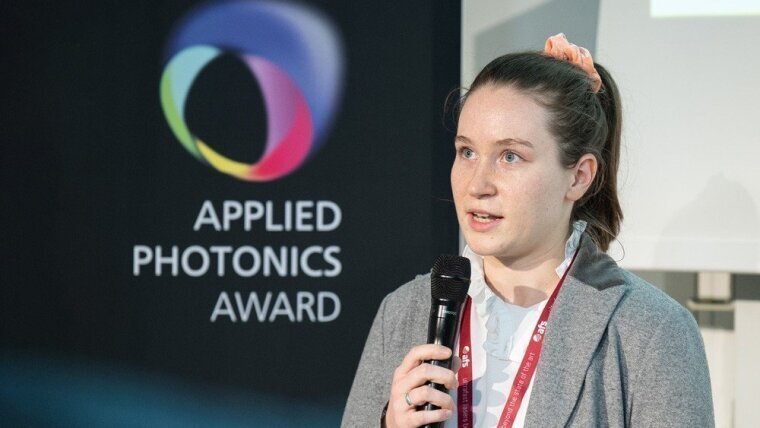Magdalena Hilbert was awarded with 1,000 Euro prize money for her Bachelor's degree thesis "Gas Sensing with 2D Materials on Exposed-Core Fibers".
With the help of sensors, gases and other organic fumes can be quickly detected and identified. This highly sensitive sensor technology depends on simultaneously analyzing various parameters such as the concentration (especially relevant for pollutants), the relative humidity or the temperature and pressure. A sensor material reacting particularly sensitive to its surroundings and, thus, reliably sharing the analyzed information with the evaluating hard- or software is needed for a well-functioning sensory system.
In her thesis Magdalena Hilbert examines how such a sensor technology can be realized with a 2D-material-coated fiber. The 2D-material on the exposed fiber core simultaneously is in contact with the directed modes as well as its surrounding. Hilbert’s research is, thus, relevant in the areas of emission control, atmospheric observation and meteorological balloons.
Best Master's degree thesis
The 2,000 Euro prize money for outstanding Master's degree thesis was handed to Felix Wechsler for his thesis "Kaleidomicroscope - A Kaleidoscopic Multiview Microscope".
The microscopy is an essential instrument in the biomedical analysis. Specifically in the case of living, biological samples, however, light microscopy with a high frame rate still poses various problems. Felix Wechsler, therefore, developed in his thesis a new kind of "Light Field Microscope" – the Kaleidomicroscope. In the research process, Wechsler placed a Kaleidoscope – a mirror box – in front of a wide-field microscope. The ASP student thereby presents an easy and equally practical method to create high resolution 3D pictures with a classic microscope and additional mirrors attached to the objective. A crucial advantage of this method is the fact that the Kaleidomicroscope can be implemented into any standard wide-field microscope including already existing systems.
Award for Scientific Excellence, Post-Graduate
Dr. Daniel Werdehausen’s dissertation "Nanocomposites as Next-Generation Optical Materials: Fundamental Properties and Potential" was rewarded with 1,500 Euro prize money by the panel of scientific excellence (Post-Graduate).
In his work Dr. Daniel Werdehausen investigates the fundamental properties of optical nanomaterials, with a focus on nanocomposites, and their potential to further develop real optical systems. His dissertation, thus, draws on an international, 20-year-old research work focusing on optical metamaterials. This intensive and lengthy research strain has not yet found its way into real optical systems, even though there is a high need from an applicational perspective to develop such systems through scientific innovations.
Werdehausen’s work exactly puts its focus on this intersection of the previously un-used research and the applicational aspect of nanomaterials: Nanomaterials are viewed as metamaterials, hence, leading to a fundamental examination to explain the previous in-ability to replace traditional optical materials with nanomaterials. Building on these initial observations the researcher shows that nanocomposites can serve as novel optical materials with material parameters, thus, possessing great potential to improve optical systems.
Other Awardees
Dr. René Kirrbach from the TU Dresden was presented with the best dissertation (3,000 Euro) for his work "Examinations of linear optical, wireless frontends and application-specific freeform lenses for wireless communication".
Furthermore, the panel of scientific excellence awarded Jan-Wilke Henke from the University Göttingen for his work "Demonstration of the interaction between free electrons and fiber-integrated photonic resonators" with 1,500 Euro prize money in the category Graduate.
The "Applied Photonics Award"
The Applied Photonics Award emerged from the "Green Photonics" newcomer-prize. The Fraunhofer Institute for Applied Optics and Precision Engineering IOF, JenaExternal link, annually awards young scientists for their original and innovative theses in the field of applied photonics. The 2022 "Applied Photonics Awards" ceremony took place with the support of The Association of German Engineers (VDI) as well as the photonics companies Active Fiber Systems, JENOPTIK and TRUMPF.
